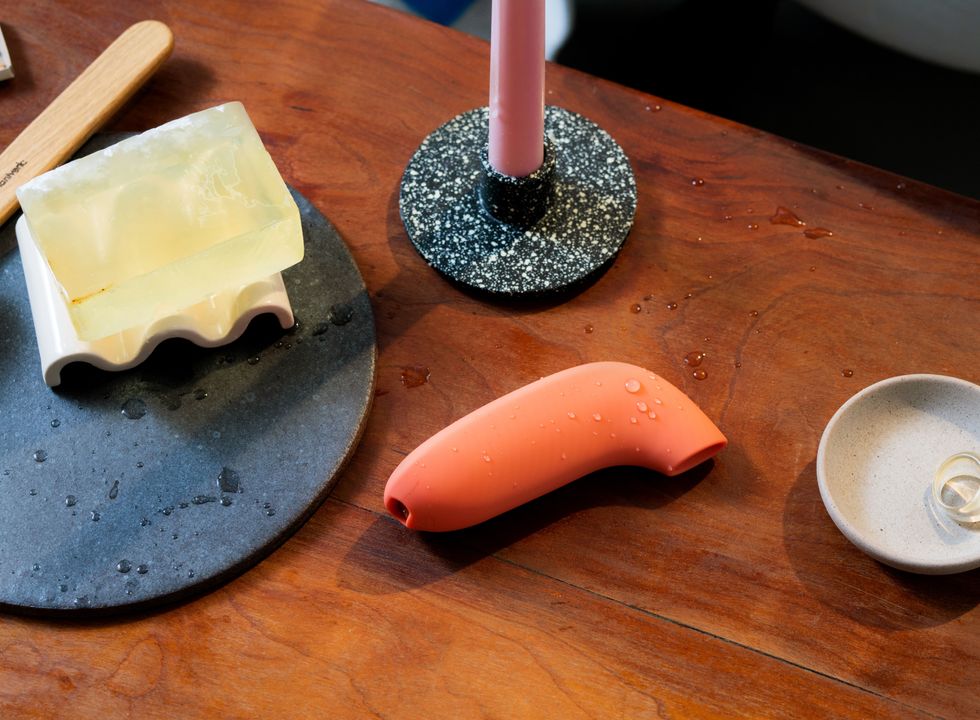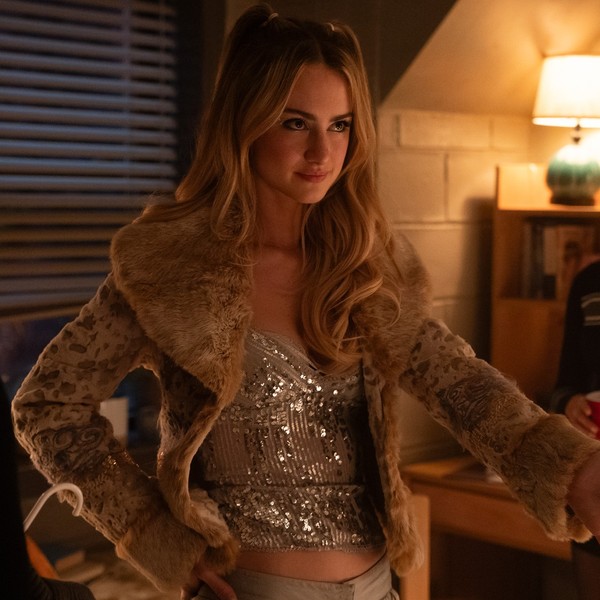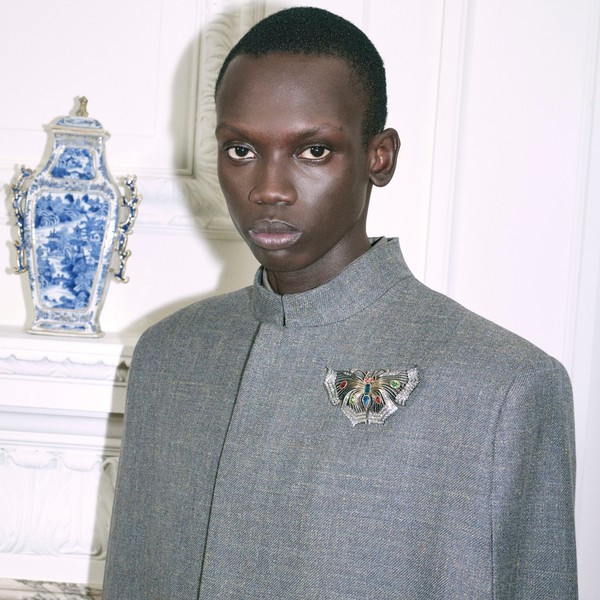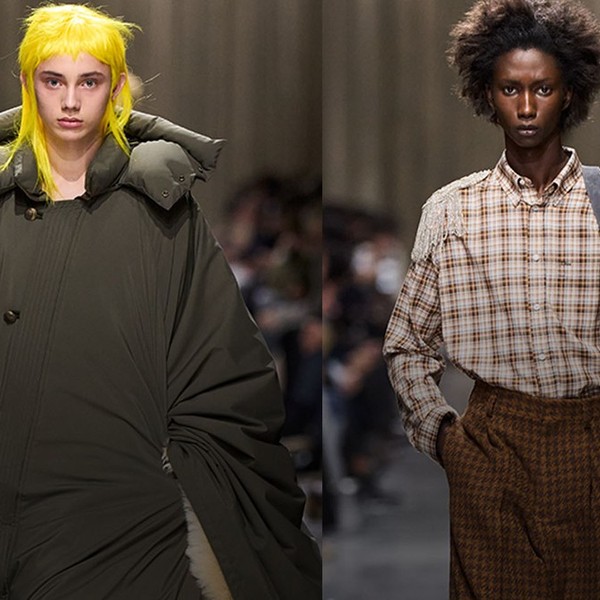Dame's Mission to Close the Pleasure Gap One Vibrator at a Time
An intimate conversation with sex toy pioneer and Dame CEO, Alexandra Fine. |
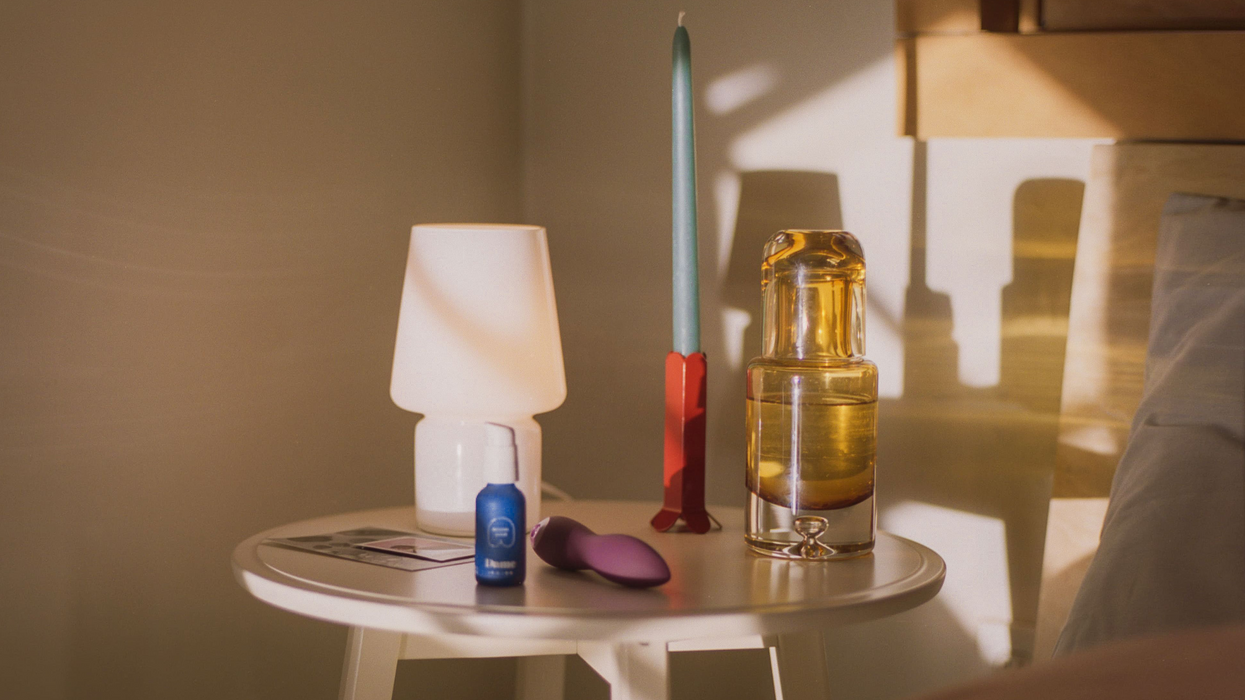
“How are you?” I ask Al Fine as they pop into the Zoom window. “I am pregnant. That’s my whole mood,” they laugh, shifting restlessly in a desk chair. Fine has an air of congenial warmth and unfiltered honesty that tells me off the bat—no questions are off limits. They are quick-witted with a conversational alacrity that makes academic topics feel, not only accessible, but deeply entertaining. Toggling effortlessly between anecdote and statistics, it’s easy to see that sexual wellness is just as much a career as it is a spiritual pursuit.
With a degree in clinical psychology and sex therapy from Columbia, Fine joined forces with MIT engineer Janet Lieberman in 2014 to change the landscape of sexual wellness with their brand Dame. With the most crowd-funded sex toy in history, they launched their debut, hands-free vibrator Eva. They made history again with the intention of Fin—the first sex toy allowed on Kickstarter. In 2019 Dame sued NYC’s subways for discrimination in advertising citing that male sexual wellness products such as Viagra or Hims were given ample ad real estate, while their ads were banned. After spending three years embroiled in a legal battle, Dame won, making their vibrators the first to be publicly advertised—if you don’t count the Hitachi Wand in 1968, but hey, that was just a back massager right?
Their motive in all of these historic battles comes back to Fine’s singular mission for Dame: to close the pleasure gap. What is the pleasure gap? When it comes to sex, only 39 percent of cishet, straight women report orgasming versus 91 percent of men. The statistic points to a brutal lack of equity in the arena of sexual pleasure. In fact, cis, hetero women are four times more likely to say sex wasn’t pleasurable in the last year. In our conversation below, Fine elaborates on the myriad factors that contribute to the gap, the nuances of sexual communication, and the majesty of queer sex.
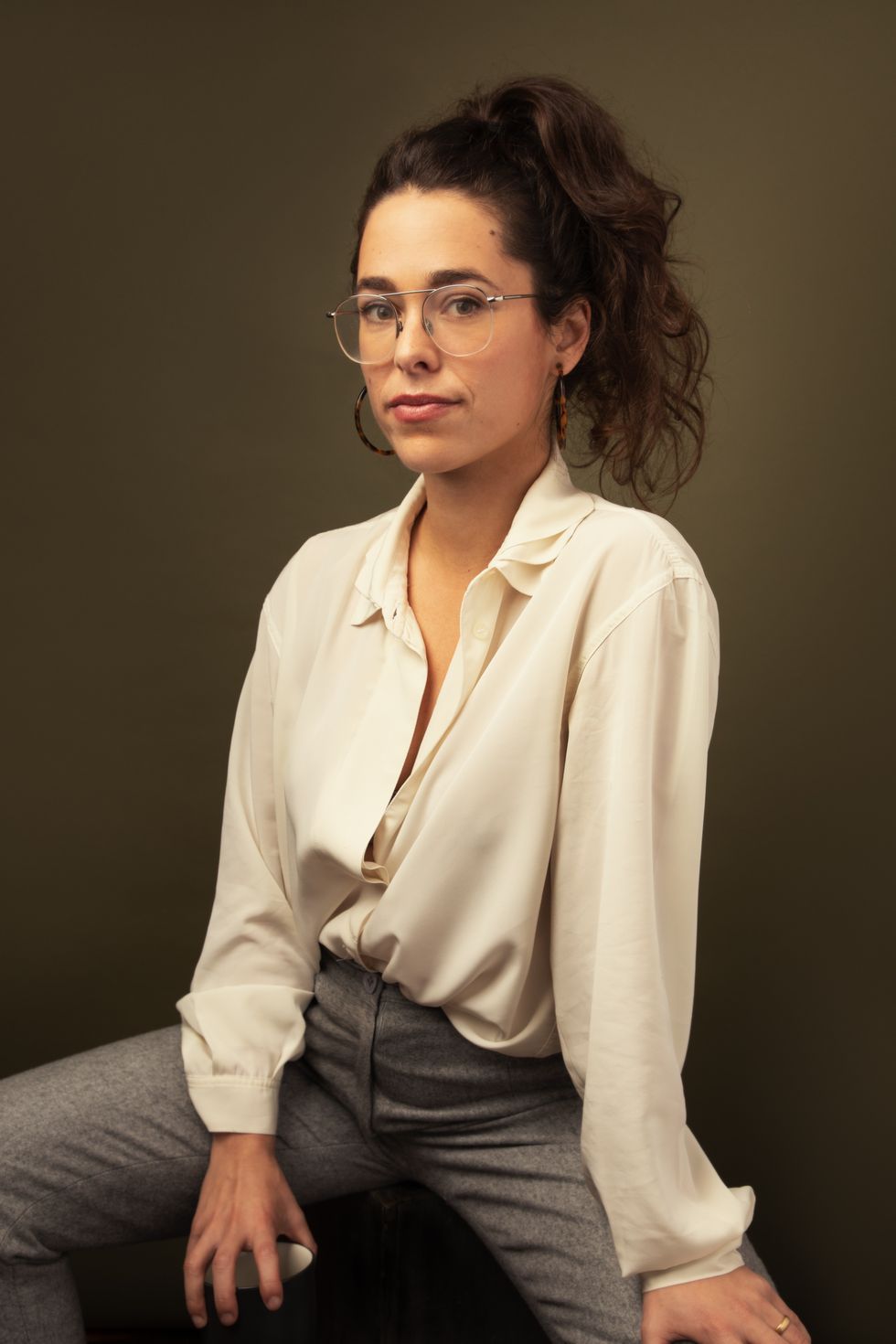
Alexandra Fine
You studied clinical psychology with a concentration in sex therapy at Columbia—what got you interested in the field to begin with?
“I remember being six and my aunt took me to a party where I met a bunch of drag queens. These drag queens were the bomb and let me ask so many questions. When I was at school, I did show and tell, and explained to my class what it meant to be a drag queen and what it means to be trans. It wasn't even really about sex, it was just about gender exploration. I got sent to the principal's office, and nobody was able to explain to me what I had done wrong. I didn't lie. I didn't hurt anybody's feelings. Everybody was kind of up in arms and I was like, what is this conversation?
“As I got older, it only became more and more apparent how important conversations about sex were. As a kid, I was definitely getting messages like, ‘Hey, you're a woman. You're going to be the center of a household one day. Oh, but we're not going to give you any information around what that means to be slut shamed.’ I was slutty. I was super slutty. I remember after my first kiss, the guy was getting high-fives and I was getting dirty looks. I thought, ‘We just did the same thing literally together. Why are we getting such different responses to it?’ I think it's because I was hotter than him [laughs], so maybe it was just very cool of him, but it was also because of slut shaming.”
It's so wild that so much of sex ed was just shame and fear getting drilled into us. There was no narrative of pleasure whatsoever.
“They were so scared that, ‘Oh if kids know that sex is supposed to be pleasurable, they’re going to have more of it.’ The argument makes no sense. Actually, if kids don't know it's supposed to be pleasurable, they're going to have painful sex.”
There was a stat saying that 23 percent of cis-het women describe having sex with no pleasure at all. What do you see as the biggest obstacle or contribution to that statistic?
“Before I answer that question, I also just want to caveat with the point that there can still be pleasure without orgasm, which is why we talk about the ‘pleasure gap,’ not the ‘orgasm gap.’ There's so much pleasure outside of orgasm, and if you get too orgasm focused, sometimes that's harder. I know that there are lots of people who don't have orgasms and have wonderful sex. But, the main contributor [to that statistic] is education. I can't believe that I still talk to women or people with vulvas—but I will say in this case, they are mostly just people who identify as women—and tell them that 70 to 80 percent of women need clitoral stimulation in order to have an orgasm. They respond like, ‘It's not just me, I'm not alone?’
“You're not alone! Another stat that I find so powerful is that only four percent of people with vulvas report that internal penetration alone is their most reliable route to orgasm. If you [look at the] media, you would think that it’s how all people with vaginas are getting most of their pleasure, but that's not true. Only four percent. That means that 96 percent need something else besides a dick or a toy in order to orgasm.”
One of the stat cites that 50 percent of cis-het women fake orgasms. What is at the core of this? Is it the fear of making a man insecure? Not wanting to do the emotional labor of correcting them? Or honestly, maybe they just want to get it over with because they have something better to do and it feels like a lost cause.
“I think it’s a lot of it at the same time. It could just be like, ‘Oh, I just want to get this over with. I don't have the bandwidth to do the emotional labor right now.’ Also I think that trying to have that conversation during sex is really hard. Giving feedback about sex in general is challenging. It’s super emotional. We are super entitled to do it in whatever way we want, but I do think that most therapists would tell you that the most effective way is to have a conversation outside of sex or while it's happening to let them know. I think people start to hit a point where you just realize what a disservice you've done to yourself—to all women—by faking it, and now this guy thinks he's good at something he's not.”
What do you see as the role of masturbation, both outside and inside relationships? There's taboo for both obviously, but it does change in a relationship too.
“I don't know if it should. It really serves a totally different purpose for me, but that's a Venn diagram. Being able to just have solo play is such a powerful way of me continuing to connect with my sexuality more easily. It's a reminder that I have that joy within me. I think it's significantly more meditative to go on a solo journey and stay in touch with your body the whole time. Having sex with one person is level two. Having sex with two people is level five. It's just different, like singing alone in the shower versus harmonizing with somebody else.
Everybody is so different, and we also change—both as a person and in a relationship. Limerence is real. Limerence is new relationship energy, like the first time you touch someone's hand and there is a shock. All of that energy does heighten the whole sexual experience. As we are in more long-term relationships, things change. You get accustomed to someone’s touch, and that’s really beautiful as well. In my personal experience, I don't need this intense warm-up when I’m dating someone new. A month later, I'm a different person to have sex with.”
There are so many misconceptions about the structure of the clitoris, and there's been so little funding and research in that field. What is the biggest misconception for you about the vulva and pleasure in general?
“That the clitoris is a much larger organ, but we always talk about it like it's just the tip of the iceberg. The whole vulva has internal structures like bulbs and wings. The lips are very sensitive. When massaged they get engorged with blood, and we truly open up. There are lady boners. There's so many misconceptions—like squirting and all of that—but I think the biggest myth is that you can't tell if a woman is aroused. I also want to say that arousal is different [from] than desire. Just because I’m physically aroused doesn’t mean I want to fuck you.”
The idea that it's mysterious and hidden is simply not true.
“I've always disliked that language, the ‘elusive’ female orgasm. It's not that elusive. I think that vulva havers orgasm like 55 percent of the time with a partner, but like 96 percent of the time when they're by themselves. They don't think it's so elusive. There is a stat that if you increase foreplay to 20 minutes or something, the orgasm rate goes up to 90 percent. I think the mental component is what takes us longer to get more aroused. I also love that foreplay can start hours before. I love sending flirty texts and/or sexting early in the day. Just kind of setting the mood for later.”
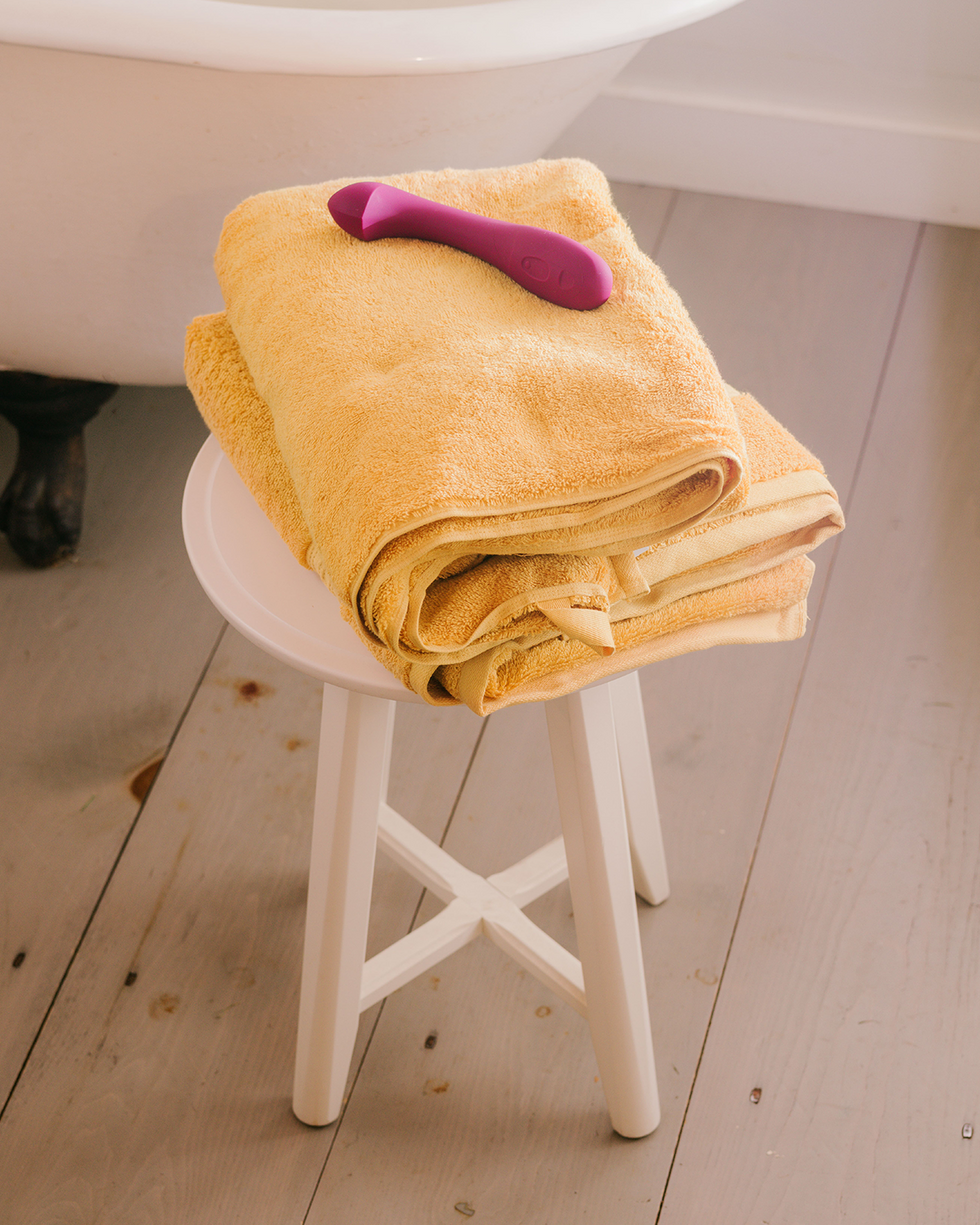
Photos: Courtesy of Dame
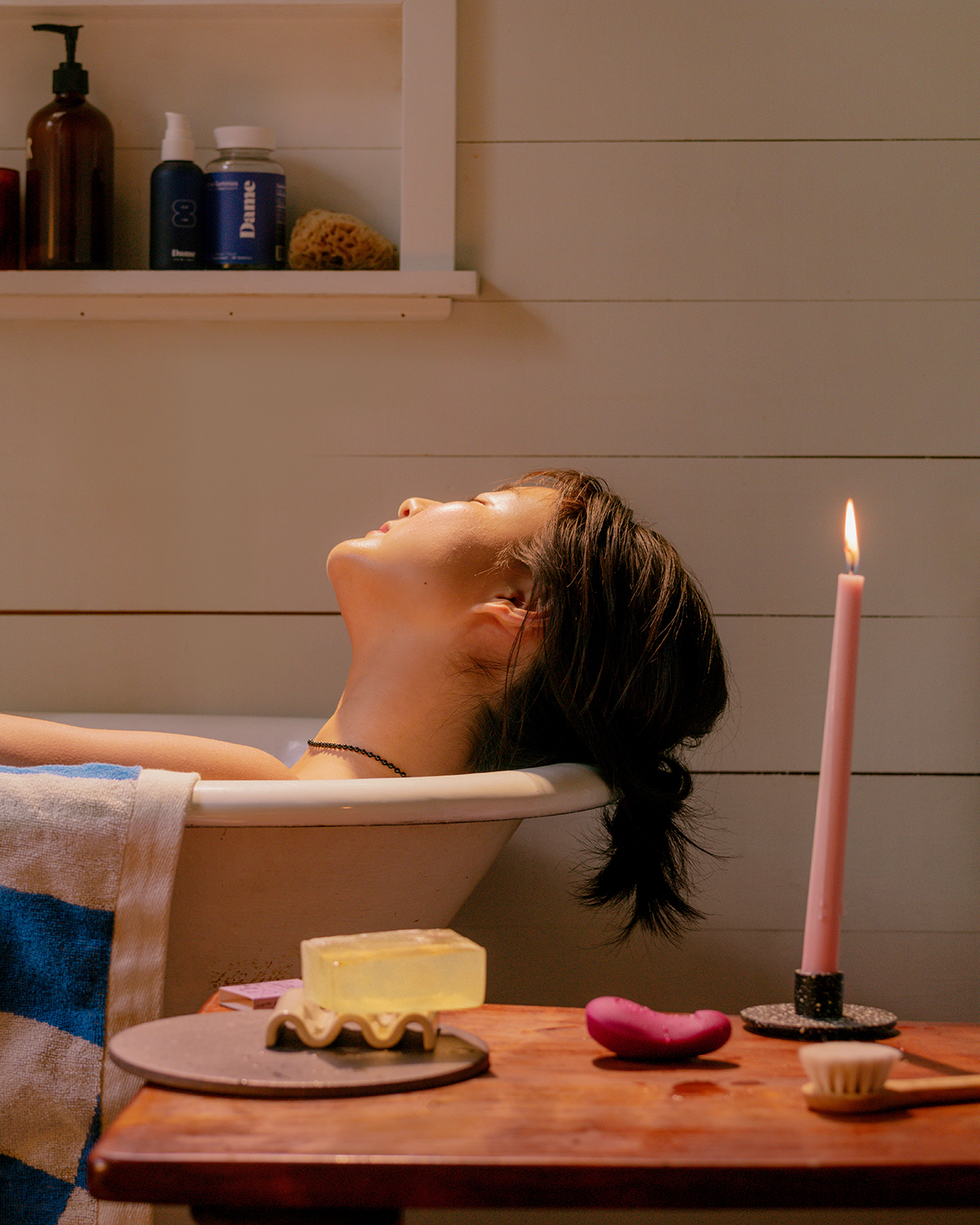
Congratulations on the MTA lawsuit, that was incredible. I wanted to ask you, what does winning that case mean for brands moving forward? What did it look like before and how is it going to look like in the future?
“The truth is I'm not quite sure. They attempted to rewrite their policy to say that no sexual wellness companies were allowed and that’s pretty much how we got them. You can't say no sexual companies and then allow some. You have to be fair. Of course, I went in with the intention of convincing them that all sexual wellness companies should be allowed. What shouldn't be allowed are things that are pornographic or create a really heightened emotional response, but how do you know something's sexual? That's not so obvious either. There are bedsheet brands that have more sexually arousing advertisements than mine. Looking at a sex toy is not that erotic, especially mine, you know? Acknowledging that sex happens and that it is supposed to feel good should not be inappropriate and our children should know that too. They should know that it's supposed to feel good.”
I saw on the Dame website that the stat on the pleasure gap doesn't really apply to queer relationships. In the heterosexual dating scene there is a certain socially implicit rulebook about how sex should go, whereas in queer relationships, there’s so little representation that you have to figure it out on your own. How do you see this playing into the pleasure gap?
“I think that’s what is so amazing about queer culture and queer experiences. I think that’s why the queer community is often so creative—scripts are thrown out. When you're following a script, you don't realize it half the time. I remember the first time I had sex with a woman and I was just like, ‘When do we stop? How do we know it's over?’ If you ask the average person, ‘When does sex end?’ Most people will tell you, ‘Sex ends when somebody with a penis comes.’ When does sex start? ‘When a penis goes into a hole.’ The whole beginning and end of sex isn't about a penis, but the story is always about a penis. It's wild. These scripts are so ingrained in our psyches, in our education, in our society, and our media. Scripts are so limiting. Another thing I love to tell people who are looking to spice up their sex lives is, ‘Have sex and do not let a penis go in your vagina.’ Just tell your partner that, that's the one thing you can't do. It opens up a whole lot of experiences to explore. Basically, everybody should just have lesbian sex all the time.”
You started Dame in 2014, what positive changes have you seen since launching this company?
“I don't remember anybody else besides us saying ‘vulva havers’ when we started marketing. Even the idea of the ‘pleasure gap’ versus the ‘orgasm gap.’ I remember my co-founder making the argument for ‘pleasure gap’ and me being like, ‘Ah, more people are going to understand the concept of an orgasm gap much quicker. It's better marketing even if it's less accurate.’ I'm really happy she won that debate.
“Inclusive language is more accurate. It’s interesting how inclusive language makes some people feel not included, and I’m like, ‘You were already included.’ I've definitely talked to people that feel like us saying ‘vulva havers’ is less inclusive of women.”
Sounds like something a TERF (Trans-Exclusionary Radical Feminist) would say.
“That's part of why I love identifying as a non-binary woman. I want to acknowledge the ways I feel non-binary because I authentically feel that way and I think it expands the conversation. It includes more people and helps people see themselves. I don't remember anybody even asking me if I ever thought I wasn't a woman until I was in my late twenties, and then I was like, ‘Wait, what? There are fucking options? Are you serious?’ I also don't want to take up so much space because I look like a woman, and my experiences have mostly been as a woman. So much of the way gender operates is due to internalized misogyny. Like sometimes in emails, I want everybody to know I'm a woman because I make sex toys and it makes them feel more comfortable to talk to me. Sometimes I would like it if everybody just thought of me as Al, because then you don't know I'm a woman and I can maybe negotiate better with you, and maybe you’re more likely to give me money.
“I had a good friend that said, ‘I feel like all strong women in the media are warriors. Why can't we just be strong women because they're moms and that is also strong?’ I feel very much the way I've manifested being a strong, independent woman is also by being a fucking dude about shit versus motherhood. Motherhood's fucking nuts. Shit is badass.”
A lot of times, for women to be seen as “powerful” it needs to be legible in the way we see male “power.” But moms or parents are some of the most powerful people. There needs to be a new language for expressing that kind of power.
“All my power concepts are also really wrapped up in capitalism, they get tied together. At the end of the day, they’re just scripts. There's so many beautiful ways of living a powerful life.”

